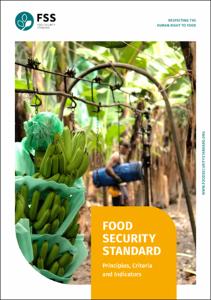Food Security StandardPrinciples, Criteria and Indicators

Food Security Standard
Principles, Criteria and Indicators

| dc.contributor.author | Gamba, Liliana | |
| dc.contributor.author | Beuchelt, Tina | |
| dc.contributor.author | Schneider, Rafaël | |
| dc.date.accessioned | 2020-12-07T16:40:46Z | |
| dc.date.available | 2020-12-07T16:40:46Z | |
| dc.date.issued | 06.2020 | |
| dc.identifier.uri | https://hdl.handle.net/20.500.11811/8833 | |
| dc.description.abstract | International demand for agricultural commodities is growing due to population growth, changes in consumption patterns and the current shift from petroleum-based to bio-based economies. This can have adverse effects, particularly in food insecure countries, as agricultural production for export can often compete with local food production while also encouraging labor exploitation, environmental pollution and resource depletion. Importing countries are becoming more concerned about the environmental and social impacts that imported products have had in their countries of origin. Sustainability standards and certification systems are recognized as valid instruments to address biomass sustainability issues. Nevertheless, the issue of food security has only been partially addressed, due to its complexity and the difficulty in allocating responsibility between individuals, the private sector and governments. The Food Security Standard (FSS) provides a practical instrument for demonstrating that the “right to food” enjoyed by farm workers, smallholder farmers and local communities impacted by agricultural production is respected. It is designed to be integrated in any existing sustainability standard in the agricultural sector and is applicable to all biomass types and uses, farm sizes and business types. The FSS includes a set of 17 Food Security Principles, 35 Criteria and 93 Indicators that build on the rights-based food security principles and criteria formulated by Mohr et al. (2015), the Human Right to Adequate Food, the definition of food security by the World Food Summit (1996) and the Right to Food Guidelines adopted by the FAO Council in 2004. The FSS is a joint initiative of WWF Germany, the Center for Development Research (ZEF) of the University of Bonn (ZEF) and the Deutsche Welthungerhilfe e. V. (WHH). | en |
| dc.format.extent | 28 | |
| dc.language.iso | eng | |
| dc.relation | https://www.welthungerhilfe.org/news/publications/ | |
| dc.relation | https://www.welthungerhilfe.org/news/publications/ | |
| dc.rights | Namensnennung - Weitergabe unter gleichen Bedingungen 4.0 International | |
| dc.rights.uri | http://creativecommons.org/licenses/by-sa/4.0/ | |
| dc.subject | food security | |
| dc.subject | sustainability standard | |
| dc.subject | human right to adequate food | |
| dc.subject | certification | |
| dc.subject | biomass | |
| dc.subject.ddc | 333.7 Natürliche Ressourcen, Energie und Umwelt | |
| dc.title | Food Security Standard | |
| dc.title.alternative | Principles, Criteria and Indicators | |
| dc.type | Arbeitspapier | |
| dc.publisher.name | WWF Germany, Deutsche Welthungerhilfe e. V., Center for Development Research (ZEF), University of Bonn | |
| dc.publisher.location | Berlin and Bonn, Germany | |
| dc.rights.accessRights | openAccess | |
| ulbbn.pubtype | Erstveröffentlichung | |
| dc.version | publishedVersion |
Files in this item

This document has got an embargo.



